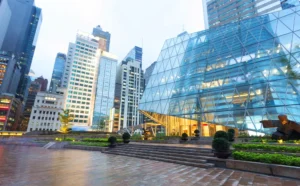Welcome to the exciting world of Real Estate Investment in New Gurgaon, a world of possibilities, growth, and opportunities for budding stars. Unravel the intricacies of real estate investment, casting a spotlight on the unique offerings of Ganga Realty. This blog will act like your compass, navigating you through the landscape of potential investments and growth prospects. Explore the opportunities and challenges of real estate investment In New Gurgaon with Ganga Realty.
Table of Contents
Understanding the New Gurgaon
New Gurgaon, also known as Gurugram or Gurgaon Extension, is an extension of the existing city and is rapidly evolving into a vibrant economic and residential hub. Situated near the Indira Gandhi International Airport and major highways, New Gurgaon enjoys excellent connectivity. This burgeoning area is swiftly transforming into a bustling economic and residential centre. In the realm of real estate investment, Ganga Realty stands out as a reliable choice. As a guide to New Gurgaon, exploring opportunities here with Ganga Realty involves tapping into the region’s growth potential, strategically located for accessibility and poised for a prosperous future.
Ganga Realty: A Trusted Name
Selecting the right real estate developer is crucial in real estate investment, and Ganga Realty stands out as a trusted name in the field. Renowned for its unwavering commitment to quality construction, transparent dealings, and timely project delivery, Ganga Realty has earned a solid reputation. For people venturing into New Gurgaon, aligning with such a reputable company is paramount. It not only ensures a smoother investment journey but also serves as a robust risk mitigation strategy. With Ganga Realty, people can navigate the complexities of real estate with confidence, forging a path towards successful and secure investments in the dynamic New Gurgaon market.
Key Factors for Developers to Consider When Investing in Real Estate in New Gurgaon
Investing in real estate is paramount to one’s life. Understand the key factors for developers in investing in real estate in New Gurgaon, ensuring sustainable and profitable ventures with Ganga Realty at the forefront:
- Location Analysis: Selecting the right location is pivotal in real estate development, and New Gurgaon’s prominence is a result of its vast land availability and supportive government policies. A thorough analysis of micro-market trends, existing infrastructure, and prospects is imperative. Identifying the perfect location within New Gurgaon sets the foundation for a successful real estate venture.
- Regulatory Compliance: Navigating the regulatory landscape is a crucial step in real estate development. Ganga Realty sets an exemplary standard by adhering to all regulatory requirements, ensuring a seamless approval process for its projects. People must familiarise themselves with local building codes, environmental regulations, and land acquisition policies. This diligence is vital to avoid delays and legal complications, providing a smoother path for project execution.
- Understanding the Target Audience: New Gurgaon’s real estate market caters to a diverse set of homebuyers, including young professionals, families, and investors. Successful developers, like Ganga Realty, recognise the importance of understanding the preferences and needs of the target audience. Tailoring projects to align with these demands not only enhances market appeal but also contributes to the overall success of the development.
- Infrastructure Development: The rapid evolution of New Gurgaon’s infrastructure landscape presents both opportunities and challenges for developers. Keeping a keen eye on upcoming projects such as metro lines, road expansions, and commercial developments is essential. Ganga Realty’s strategic approach involves selecting locations poised for infrastructure growth, ensuring that their developments appreciate value over the long term.
- Market Trends and Pricing Strategy: Staying on top of market trends is essential for any developer venturing into New Gurgaon’s dynamic real estate market. Gurgaon’s real estate landscape is ever-changing, and pricing strategies must align with current trends. Ganga Realty leads by example, utilising a data-driven approach to determine optimal pricing. This ensures competitiveness and attractiveness to potential buyers, a crucial aspect of success in the bustling real estate market of New Gurgaon.
Opportunities and Challenges in Investing in Real Estate in New Gurgaon
In navigating the real estate landscape of New Gurgaon, developers can capitalize on these opportunities while addressing the associated challenges. Let us address these aspects for developers seeking success in this burgeoning market:
1. Rising demand for affordable housing
Opportunity: New Gurgaon is experiencing a surge in demand for affordable housing, presenting developers with a lucrative opportunity. By focusing on creating budget-friendly housing options, seekers can tap into this growing market and cater to the needs of a diverse range of homebuyers.
Challenge: The challenge lies in striking the right balance between affordability and quality. Developers must navigate cost-effective construction methods without compromising on the essential aspects of comfort and durability. Ganga Realty has successfully embraced this challenge, offering affordable housing solutions without compromising on their commitment to quality construction.
2. Commercial Development Boom
Opportunity: The commercial sector in New Gurgaon is on the rise, attracting a significant workforce. Developers have the chance to capitalize on this trend by exploring mixed-use developments that integrate residential and commercial spaces. Ganga Realty’s integrated townships exemplify this approach, offering a holistic and self-sustaining lifestyle for residents.
Challenge: Creating successful mixed-use developments requires a nuanced understanding of both residential and commercial needs. Developers need to ensure a harmonious balance between these components to create vibrant and functional communities. Ganga Realty’s track record in this area positions it as a model for successfully navigating this challenge.
3. Competition in the Market
Opportunity: The vibrant real estate market in New Gurgaon provides ample opportunities, but developers must be prepared to face stiff competition. Standing out in a crowded market necessitates innovative designs, unique value propositions, and effective marketing strategies. Ganga Realty’s established brand reputation and commitment to quality give it a competitive edge in the market.
Challenge: The challenge lies in creating a distinct identity amidst numerous competitors. Developers must leverage their strengths, whether it’s a unique design concept, eco-friendly initiatives, or community-focused amenities, to set themselves apart and attract potential buyers.
4. Infrastructure Lag
Opportunity: While New Gurgaon is rapidly developing, certain areas may experience temporary infrastructure lags. Developers can turn this challenge into an opportunity by strategically investing in areas with imminent infrastructure upgrades. Ganga Realty’s strategic location selection is a testament to this approach, ensuring long-term value appreciation for their developments.
Challenge: Navigating temporary infrastructure challenges requires careful planning and communication with prospective buyers. Developers must transparently convey their plans to address these issues and highlight the long-term benefits of their chosen locations.
Final Thoughts
Investing in real estate in New Gurgaon presents developers with attractive opportunities coupled with challenges that demand strategic planning and execution. Choosing a reliable partner like Ganga Realty, with its proven track record and market insight, can enhance the prospects of success in this dynamic market.







